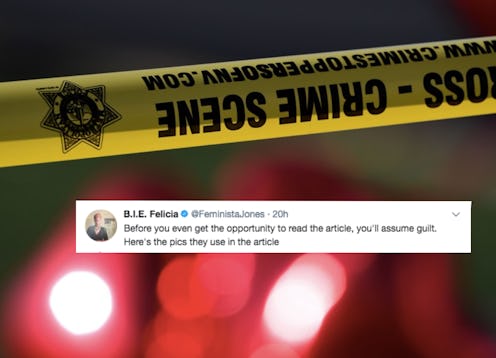Life
A News Outlet Used A Black Woman’s Mugshot To Tweet About Her Murder, & It’s Part Of A Horrific Pattern

Black people have long faced a variety of widespread and harmful stereotypes, which can sometimes lead to racial profiling. One study found that "criminal predator" is often used as a euphemism for a black suspect, looking as far back as the Civil Rights Movement. Another analysis reported that white Americans tend to overestimate the number of minorities who actually commit crimes. With so much history here, it isn't shocking that black Americans are sensitive to how people of color are portrayed in the media. On Wednesday, a Florida news station tweeted a black woman's mugshot accompanying a story about her murder — but later updated the story to include her graduation photo and other non-charged images. People on Twitter were quick to react, calling out the practice.
According to the story from WPLG Local 10, 24-year-old Ashley Francois was shot multiple times while standing outside an apartment complex in Homestead, Florida, and the Miami-Dade Police Department is still searching for the killer. The police department also used Francois' mugshot in a press release about the murder. A police department spokesperson tells Bustle that it's the department's policy to use either a driver's license or inmate booking photo on its flyers.
"Those are the photos that are available," says Robin Pinkard, public information officer for the Miami-Dade Police Department. "We don't go on social media sites because they're no way to accurately identify if that's that person."
WPLG executive producer Jeff Tavss tells Bustle in an emailed statement that the station updated the story once they had other pictures of Francois:
In regards to the photo in question of Ashley Francois, the Miami-Dade Police Department distributed the photo when she was identified as the murder victim. We used that photo for the first stories that were published and used for a Tweet.
However, once we received, and were given permission to use, other photos of Ms. Francois, we immediately changed the photo on the web story. That change occurred within a few hours.
Our reporter on the story spoke to Ms. Francois’ family and they were completely understanding of our use of the initial photo.
In the updated article from the news station, there is a picture of Francois at a graduation ceremony. The original tweet from the news station had about 200 likes and 100 retweets Friday morning, but the responses from other Twitter users have garnered tens of thousands of interactions. Even though the article was updated, the reactions have remained consistent: Why use a victim's mugshot when they've committed no crime? Twitter user @Era21_ responded to the tweet from the television station and said, "The media is so wrong! My cousin has other Beautiful pictures But [sic] they choose a mugshot to show the world who she is."
Even people who didn't know the victim have spoken out. Author, social worker, and activist Feminista Jones shared her thoughts in a Twitter thread that has since gone viral.
In a follow-up tweet, she added, "This is gross [and] deliberate. It immediately causes you to be suspicious and afford her no empathy in her own death."
Even though the television station replaced the photo in the web story, people are still replying to the original tweet and expressing their frustration.
The story about Francois' death isn't the first time social media users have gathered en masse to criticize news coverage. In 2014, #IfTheyGunnedMeDown trended on Twitter after Michael Brown was killed by a police officer in Ferguson, Missouri. News organizations were called out for using "particularly ominous" pictures of Brown, even though there were other pictures of him available. The hashtag had a simple premise: Black people asked themselves, "If I died, which pictures would media outlets use?" The resulting tweets were powerful.
Last year, a CNN analyst caused an uproar after arguing black people are more prone to committing crimes, a mindset that arguably contributes to people conceptualizing black people — even in death — as dangerous. It's not surprising black and Latinx people don't trust media outlets to fairly portray minorities in news coverage, but it does give the media a reason to remain sensitive, especially when covering black victims.